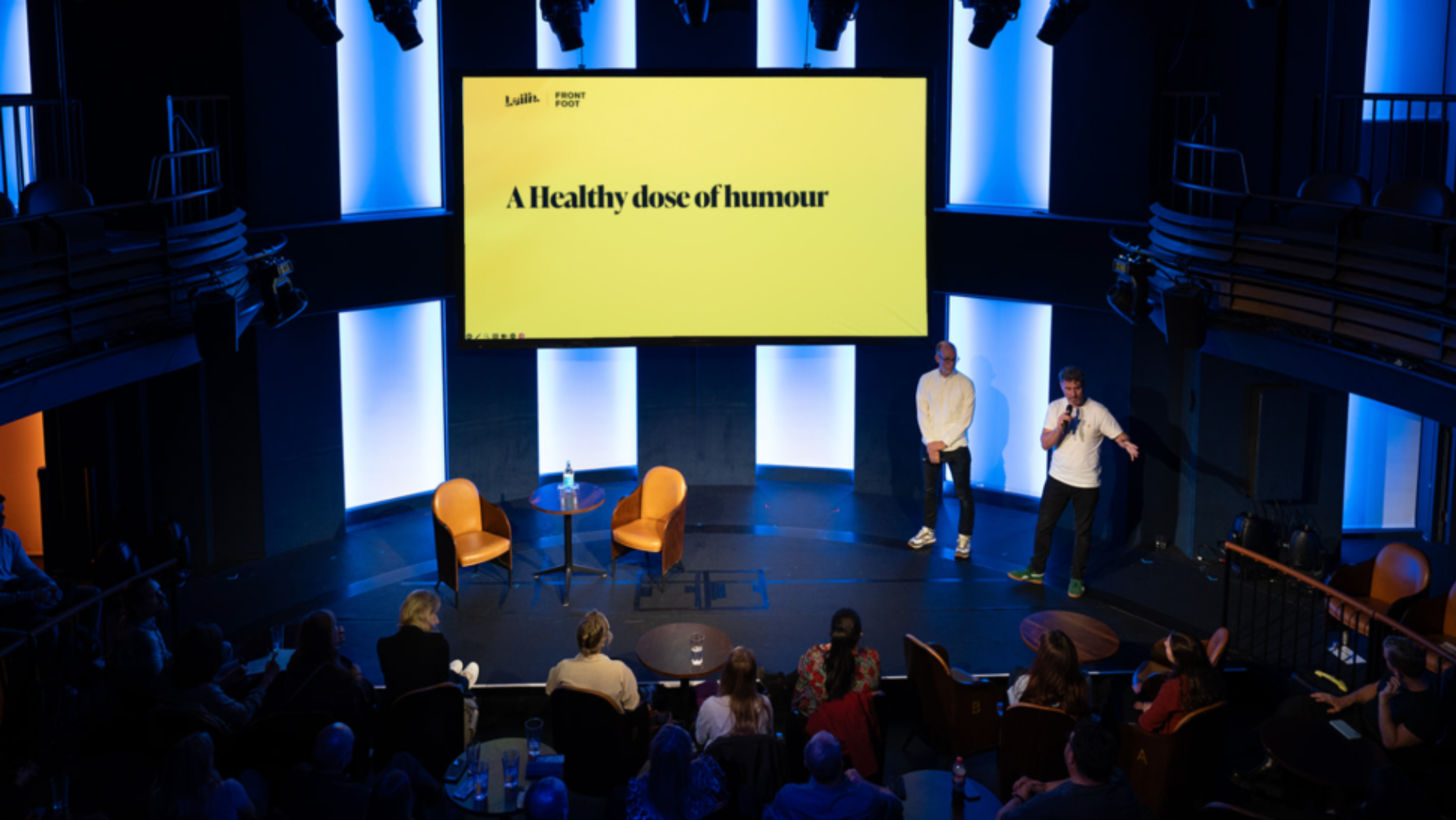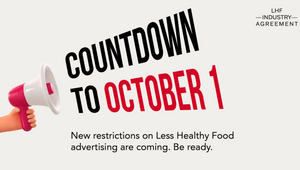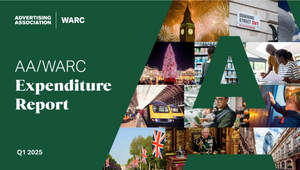
The Advertising Association and Leith Prescribe a Healthy Dose of Humour

The Underbelly Comedy Club in London’s Soho has probably never hosted an advertising conference, but the recent Advertising Association x Leith event, ‘A Healthy Dose of Humour’ was the perfect moment to remedy that. At a time when advertising needs to find its funny more than ever, hitting a comedy club is a good idea.
Advertising Association commercial director Sharon Lloyd Barnes introduced the event. Keen to assert that she was not a warm up act, she put the event into context for the 100+ advertising and marketing industry professionals in the room. Sharon noted that the Advertising Association’s role is to represent the ad industry in the UK and promote advertising that’s trusted, inclusive and sustainable:
“We’ve been tracking public trust in advertising for many years and doing a deeper dive for the last six,” she said. “Many of you will have seen that research and the fact that the biggest positive driver of trust in our work is great creativity – ads that connect with people in some way, make them laugh or even cry. Part of our ongoing programme is to celebrate and showcase work that the public loves.”
With Cannes Lions introducing a humour category for the first time ever this year, comedy has been discussed more in the industry of 2024 than it has been for many years.
Next up, it was over to Leith partner Brian Coane and the AA’s research director Dan Wilks to underline this with some facts and figures and discuss: ‘Why funny ads are serious business’.
In fact, making people laugh is more serious than you might think. Brian and Dan showed in their presentation how humour is the most powerful driver of effective communications. Research from Credos (“the advertising industry’s think tank”), said Dan, shows that people who regularly laugh at advertising are:
- Twice as likely to notice advertising.
- Three times as likely to remember advertising.
- And four times as likely to respond to advertising.
With 72% of people saying they would choose a funny brand over a competitor, it’s clear that getting audiences laughing has potential to build brands and drive sales. But in recent years it’s not been easy, to say the least. And research on the number of funny ad campaigns reveals that since the global recession in 2008, humour in advertising has been generally in decline, with a pronounced dip in its prevalence over the covid-19 pandemic. While ‘gallows’ humour usually surfaces when people feel ‘you’ve gotta laugh or you’ll cry’, it seems that for brands, that has rarely been a motivator.
Brian detailed how laughter can be powerful medicine in dark times though, pointing to ‘The Decameron’ - 14th century fiction that helped people laugh during a time of plague (sound familiar?) that was recently adapted into one of 2024’s most riotous sitcoms on Netflix. He even pointed to the emergence of Dadaism as a response to the horrors of the First World War. Similarly, Leith’s work with the Scottish Government on its cancer awareness campaigns hasn’t been afraid to laugh in the face of life-threatening illness, with lines such as ‘Your boobs saved my life’ and ‘Don’t be snobby. Test your jobby’’.
Dan then explained the two key reasons it appears that brands have moved away from humour – media fragmentation and fear of failure. People don’t all have the same sense of humour anymore, depending on what bubble of the internet they live in. And the potential to offend or start an internet storm of controversy is always in the back of marketers’ minds. The session ended with a challenge to the Advertising Association audience: How can we all be braver by being funnier in the work we make and buy?
Leith’s Marion Miranda and Debbie Morgan next took the stage, imploring the crowd with their message: ‘Don’t Fear Funny’. Echoing the earlier discussion, they revealed that 95% of business leaders fear using humour and recognised the motivations for this. But something advertisers should also fear is ‘The Beige Tax’ – brands with dull advertising need to spend 7.3% more on media than funny brands to have the same effect, they shared – an average of £9.8m per brand in the UK.
Marion and Debbie then went some way towards providing a less beige route for all sorts of brands, explaining seven different types of brand humour to suit seven different tones that brands find themselves most comfortable communicating in, highlighting that audiences have a sense of humour, even if your product or service might seem serious. Kmart and CeraVe might not seem like fertile ground for comedy, but campaigns like ‘Ship My Pants’ and ‘Michael CeraVe’ prove that assumption wrong.
The audience was then welcomed to a fireside chat billed as ‘A funny conversation’ between comedy director Amanda Baker and Leith executive creative director Phil Evans. They spoke in depth about the craft of comedy, from the power of timing to ‘designing’ a type of laugh that you want to evoke from audiences. Amanda revealed that she’s identified 95 ways of telling jokes and engaged with Phil’s explanation of advertising’s recent preoccupation with ‘purpose’. In a sea of brands claiming they’re really all about changing the world or reforming society, just making people laugh is a chance to stand out, the pair agreed.
Finally, the stage at the Underbelly returned to its primary purpose as a stand-up set from Ria Lina rounded off the event. For anyone in the audience who wanted to start making advertising funnier, it was a masterclass.
LBB’s Alex Reeves caught up with Ria after the event, to get her response as a comedy expert who was placed in this bizarre advertising environment.
LBB> Do you remember any funny advertising from when you were growing up?
Ria> We all remember jingles from adverts from childhood, especially since we didn't see anywhere near as many of them on TV as we are bombarded with online today. The ones that still rumble through my brain on occasion include, "I feel like chicken tonight, chicken tonight", which you can't sing without doing the arms; "As they say, at BK, you got it", which is annoyingly catchy given that McDonald's are now more flexible with your order than Burger King; and randomly, the very end of a radio advert to do with cars or MOTs, which concluded with the very catchily sung 'catalytic converter' (please message me on socials if you know what I'm talking about. It played regularly around the mid-late ‘90s on 104.9FM, the original frequency of Magic Radio).
But the funniest advert that is forever burned into my brain, and probably yours, began with the plucking of the double bass before the piano came in over the top, and would never in a million years be allowed today: the infamous "Happiness is a cigar called Hamlet". If anything proves that humour works, it is this ad, which ran in various iterations for over 30 years.
LBB> What will stay with you from the Humour in Advertising event?
Ria> The event was eye-opening for someone not in the industry. I could have sat and watched funny adverts all day because let's be honest, when done well, they are incredibly moreish. It's fascinating how the product designed to stop us from going to the loo or making another cup of tea in the advert break is the inadvertent front-runner to the most popular form of video content consumed today, the reel. Both of course heavily rely on humour for (viral) success. As a comedian, I was interested in the correlation of type of company to type of humour - demonstrating that there isn't a single brand that can't utilise humour in some way. If anything, is there a reason not to be funny in your advertising? I tried to identify a product that couldn't afford/doesn't use humour, and after quite a long time I arrived at: perfume. I believe perfume has taken itself so seriously for so long, that their ads have become a genre of their own. I can't think of a single scent ad that doesn't have a chiselled celebrity on an overproduced set, doing their own navel-gazing voice-over. If anyone out there represents a perfume that wants to break the mould, call me, I would relish the challenge.
Having demonstrated that humour can come in all sizes, so to speak, it was noticeable how often the reference to 'fear of getting it wrong' came up. Surprisingly, it's the fear of setting the wrong tone, offending, being off the mark, that prevents brands from utilising it more frequently. It was even explained that adverts without humour (beige or white ads) cost brands a lot more money for the similar outcomes. The most recent large failure, a Pepsi ad with Kendel Jenner, utilised no humour at all.
The most eloquent point of the afternoon, however, was made by Amanda Baker, the comedy writer and director who works closely with Jimmy Carr (among others), who said, "If you're scared of getting it wrong you're not being inclusive enough" determining once and for all: there is no excuse not to use humour in advertising.
LBB> If we're all agreed that advertising needs to get funnier again, what's your advice to advertising agencies and the brands they work for?
Ria> Employ comedians! We write, we perform, we live and breathe comedy. If you're unsure how to use comedy (or how to be inclusive) then reach out for advice. And once you have your script, get comedians to perform and represent it on screen/online. Our purpose when we perform is to be authentic, and it's the balance of humour with authenticity that will determine the success of your advert. Jack Dee repped John Smith, Rowan Atkinson Barclaycard, and more recently Craig Murray is the face of PlusNet, while the voice of Diane Morgan (of Philomena Cunk fame) has been heard across several brands. A famous comedic voice will instantly increase the familiarity and trust your brand is looking for through cross brand association.















